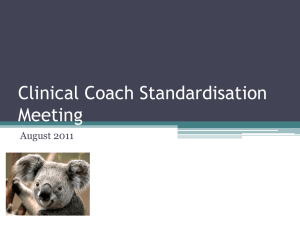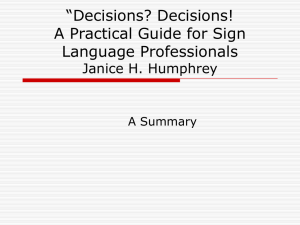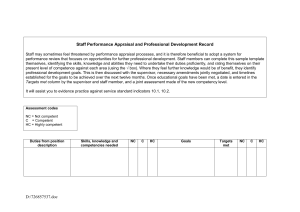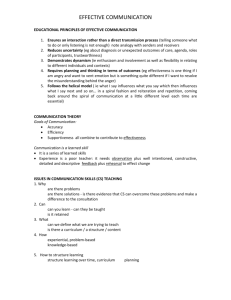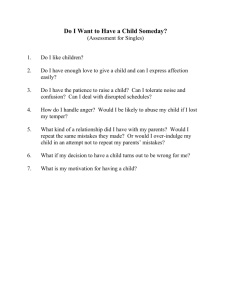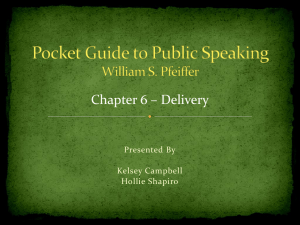Competence
advertisement
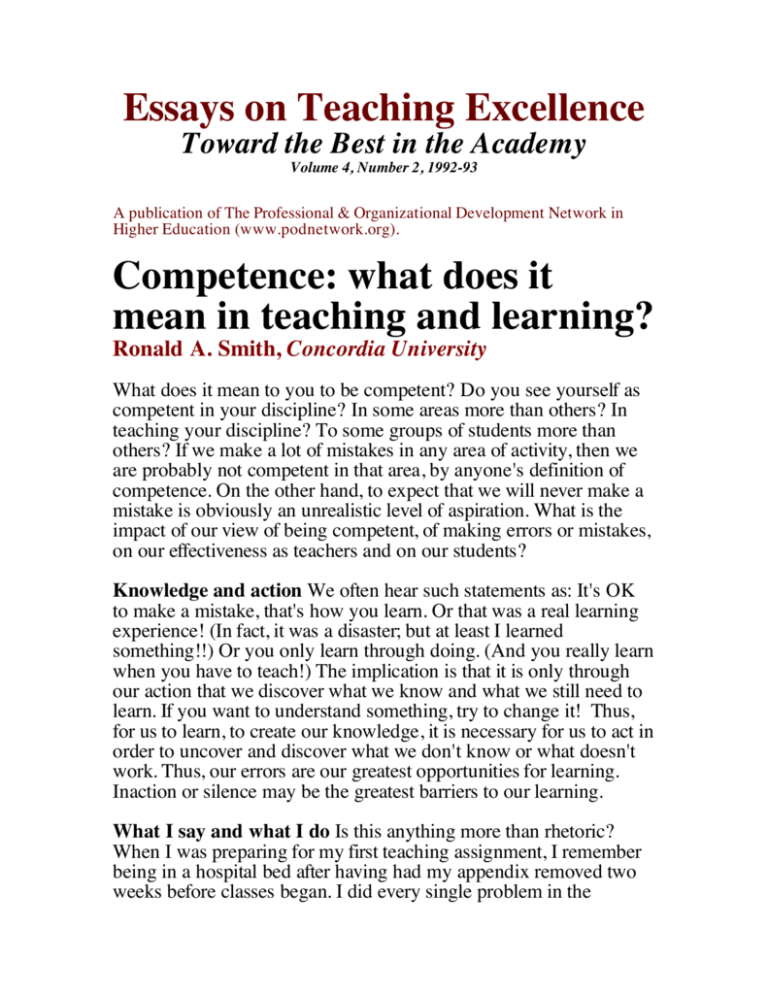
Essays on Teaching Excellence Toward the Best in the Academy Volume 4, Number 2, 1992-93 A publication of The Professional & Organizational Development Network in Higher Education (www.podnetwork.org). Competence: what does it mean in teaching and learning? Ronald A. Smith, Concordia University What does it mean to you to be competent? Do you see yourself as competent in your discipline? In some areas more than others? In teaching your discipline? To some groups of students more than others? If we make a lot of mistakes in any area of activity, then we are probably not competent in that area, by anyone's definition of competence. On the other hand, to expect that we will never make a mistake is obviously an unrealistic level of aspiration. What is the impact of our view of being competent, of making errors or mistakes, on our effectiveness as teachers and on our students? Knowledge and action We often hear such statements as: It's OK to make a mistake, that's how you learn. Or that was a real learning experience! (In fact, it was a disaster; but at least I learned something!!) Or you only learn through doing. (And you really learn when you have to teach!) The implication is that it is only through our action that we discover what we know and what we still need to learn. If you want to understand something, try to change it! Thus, for us to learn, to create our knowledge, it is necessary for us to act in order to uncover and discover what we don't know or what doesn't work. Thus, our errors are our greatest opportunities for learning. Inaction or silence may be the greatest barriers to our learning. What I say and what I do Is this anything more than rhetoric? When I was preparing for my first teaching assignment, I remember being in a hospital bed after having had my appendix removed two weeks before classes began. I did every single problem in the calculus book, even the very easy ones, the ones at the beginning of the problem sets. I certainly learned a lot of calculus! And I learned from my errors. Fortunately for me, the answers were in the back of the book, so I knew when I had made an error and I could correct it. I could figure out what I had done wrong and correct it. But, I certainly didn't want to make any mistakes in front of my students. I learned from my mistakes; but I would just as soon do that in private. Maybe it is just learning from errors in public that is problematic! Unexpected consequences What did my students learn? They learned that I didn't make many mistakes. They also learned that I was very worried about making mistakes, and I got quite anxious when I did. Unfortunately, they also learned that competence meant to be able to solve problems without any apparent hesitation (without consulting my notes was even more impressive). My own confidence in my skills, my sense of my competence as a mathematician, came from my belief that given enough time I could probably solve any problem (at least in the textbook), even the really hard ones. However, what I presented to my students was error-free problem solving - every move I made worked. If they could only see the piles of scrap paper when I really worked on solving a problem; rather than just demonstrating problems I'd already solved. (First, second, and third drafts of a piece of writing are the equivalent in other fields.) In my efforts to be competent, (and to appear so to my students) I unintentionally communicated to them an unrealistic image of what doing math was like. My skilful performance created in the students' mind two images of what competence was. First, it was to be able to act quickly without error and without much apparent thought (that usually left them in awe of me and feeling terribly incompetent themselves, thinking that if they made errors or if it took them a long time to solve a problem, they must not be very good). My thought processes, my struggles with my own errors were generally invisible to them, except when I got stuck. It was then that I really had to demonstrate my competence. How did I behave when I had a real problem to solve? That was when they got to see me really think through a problem. If I talked out loud about what I was thinking, they got to see problem solving in action. That was a real benefit for them in terms of learning how I thought about a problem, what alternatives I considered, how I evaluated them, etc. However, that is also when I unintentionally sent the second message about competence. I was surprised that I couldn't do it easily, but more than that I was embarrassed. And those feelings communicated many more messages. Mistakes are to be avoided. Especially in public. Binds for teachers Each of us plans our classes to be successful. We want to be inspirational and to motivate our students, to actively engage them in thinking critically about the material, to give them helpful and constructive feedback on their work, to give brilliant presentations, and to answer their questions with insight. What do you do when you believe your class is not working, when your students are not responding to your best efforts to be helpful to their learning? If you admit to them that you don't know what is going on or what to do to fix it, they may see you as incompetent. If you don't tell them and act as if nothing is wrong, they may also see you as incompetent. This dilemma can have further complications. If we see hiding our confusion and our uncertainty as a lack of strength, either intellectual or moral, then we see ourselves as weak. To eventually admit to our class that we were withholding our confusion or uncertainty, and that we were afraid to say that we didn't know what to do, is to admit that we were making another error. We were not strong enough to admit our weakness. Thus, we find ourselves caught in a trap. We don't know what to do and we can't admit that we don't know what to do. Binds for students I believe our students also experience similar binds. If I tell my professors that I don't understand something, they will think I'm incompetent and may fail me. If I don't tell them, I won't learn and I will be incompetent and fail. The other complications for students are: If I admit to the professor that I 'm afraid to ask questions, he/she may see me as weak and making a big mistake. If I do ask a question, the other students may think I'm incompetent (that's a dumb question, you're slowing down the class, etc.). If I do admit to them that I'm afraid to ask questions, they may see me as weak and dependent. Yet, these binds, both for the professor and the student are rarely discussed in class. Another way to think about mistakes One way to begin to get beyond these binds is to reframe what it means to be competent, and what it means to make an error. I believe that each of us plans our actions to be successful, to achieve our goals or intentions. Whenever there is a mismatch, when our actions don't achieve our intentions, when there is a gap between what we intend and what we produce, we are making an error. Although we all make errors, no one ever intentionally sets out to produce such an error (to do so would be to be successful). This detection and correction of the gaps between what we intend and what we produce is a form of problem solving. One set of criteria for judging the success of our problem solving efforts is the extent to which: -the problem is solved, -it stays solved, and -the relationships among those involved are not harmed. Any behaviour which limits our effectiveness as problem solvers, which limits our ability to detect and correct these gaps, can be interpreted as incompetence. We are incompetent when we behave in ways which limits our learning about our effectiveness, when we behave in ways which shut down inquiry. We are competent when we keep the inquiry going. Some examples of incompetence Making judgements without checking them out. If I decide that a student, or a class, is not working at an acceptable level, is unmotivated, lazy, or unprepared, and act as if these judgements are true without checking them out with the student(s), then I could be wrong. And I would be responsible for limiting my effectiveness in solving the problem. Advocating my position without inviting inquiry. If I decide what the best way to learn my subject is and what is the best way to run our classes, then tell the students my decision, without inviting their input, I may be wrong; and the students may feel controlled and misunderstood. Withholding information. Whenever I deliberately withhold information, even with the best of intentions, I create the conditions for errors. When I decide what is good for a particular student (e.g., they need to be pushed because they lack initiative), or for me (avoiding a discussion with a student who is making irrelevant comments in order to test my authority) but don't tell them because I think they, or I, might get upset; I limit the learning opportunities for me and for the student. Effective problem solving requires that we behave in ways which promote: 1) the generation of valid information about the issue(s) at hand (otherwise we may be working with incorrect information or solving the wrong problem); 2) free and informed choices about the action to be taken (otherwise participants will feel misunderstood and controlled); and 3) internal commitment to monitoring the outcomes of our choices. To be competent is to not make many errors. Competence is also what you do when you think you are making an error. If you pretend that everything is OK, that there is really no problem; then you are incompetent. You are limiting your ability to learn about what is happening (to diagnose the problem), and to learn about what might be done to improve the situation (to invent and produce solutions). You are also limiting the students learning about what it means to be competent and how to handle difficult situations. If you would like to read more about these ideas consider the following: Argyris, C. (1987) Skilled Incompetence. Harvard Business Review. September-October.Argyris, C. (1991) Teaching Smart People How to Learn. Harvard Business Review. MayJune. Argyris, C., Putnam, R., and Smith, D., (1985) Action Science. San Francisco: Jossey Bass. Schon, D. (1987) Educating the Reflective Practitioner. San Francisco: Jossey-Bass.
